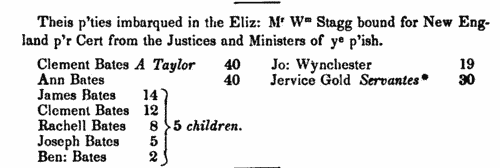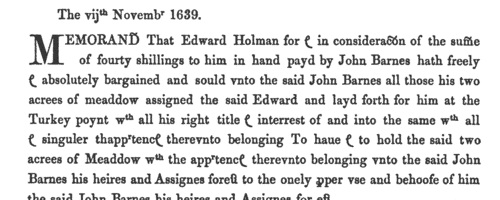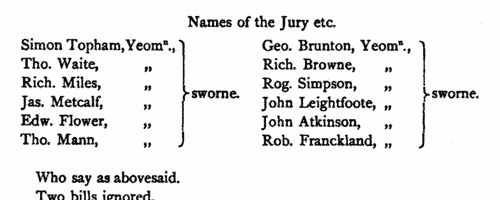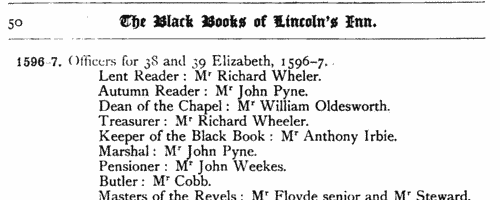Pease Surname Ancestry ResultsOur indexes 1000-1999 include entries for the spelling 'pease'. In the period you have requested, we have the following 374 records (displaying 21 to 30): Single Surname Subscription | | | Buying all 374 results of this search individually would cost £1,990.00. But you can have free access to all 374 records for a year, to view, to save and print, for £100. Save £1,890.00. More... |
These sample scans are from the original record. You will get scans of the full pages or articles where the surname you searched for has been found. Your web browser may prevent the sample windows from opening; in this case please change your browser settings to allow pop-up windows from this site. Wills proved at York: Names of Testators
(1627-1637)
The diocese of York comprised most of Yorkshire, and Nottinghamshire: the York Exchequer court was the ordinary probate jurisdiction for the Yorkshire part of the diocese, but some wills from Nottinghamshire and other parts of the province of York were also proved there. Dr Francis Collins compiled this index to the transcribed wills of the Prerogative and Exchequer Courts in the York registry proved from 1627 to 1637. The date on the left is that of probate; the testator's full name is then given (surname first), parish or place of abode, and sometimes occupation, and date that the will was executed; and volume and folio number where it the transcript commences. The Act Books were used by Dr Collins to supply deficiencies in the information from the transcripts.PEASE. Cost: £2.00.  | Sample scan, click to enlarge

| English passengers to New England
(1632-1637)
Samuel G. Drake searched British archives from 1858 to 1860 for lists of passengers sent from England to New England, publishing the results in 1860 in Boston, Massachusetts. Adult emigrants transported to New England in the period 1632 to 1637 had to take oaths of allegiance and religious conformity, certified by parish priest, mayor or justices, and these certificates form the core of this book, but it also includes a list of 'Scotch Prisoners sent to Massachusetts in 1652, by Order of the English Government', and various other passenger lists and documents, dating as late as 1671. The early lists included the children, and normally gave the full name and age of each person. This is the index to the passengers.PEASE. Cost: £2.00.  | Sample scan, click to enlarge

| The Founders of New Plymouth
(1620-1651)
(New) Plymouth colony was settled 120 Puritan families from England who landed there in 1620. New Plymouth and Massachusetts Bay were united in 1692 as Massachusetts. The manuscript volume in which the earliest records of the colony are entered is entitled "Plymouth Colony Records, Deeds, &c., Vol. I, 1627-1661" and "Book of Indian Records for their Lands". This book was edited by David Pulsifer and published in 1861 by order of the legislature of the Commonwealth of Massachusetts. The principal contents are records of the establishment of the colony, the initial land grants, distribution of the few cattle brought across the Atlantic, and the subsequent deeds by which land transfers took place, and servants were indentured.PEASE. Cost: £4.00.  | Sample scan, click to enlarge

| Official Papers
(1651)
The State Papers Domestic cover all manner of business relating to Britain, Ireland and the colonies, conducted by the Council of State, as well as other miscellaneous records. These records are from January to October 1651.
PEASE. Cost: £4.00.  | Sample scan, click to enlarge

| Quarter Sessions for the North Riding of Yorkshire
(1647-1658)
The Quarter Sessions minute books for the North Riding from October 1647 to January 1658 were edited by the Rev. J. C. Atkinson for the North Riding Record Society and published in 1887. These are abstracts of sessional orders, minutes of criminal cases, memoranda and other entries of record concerning the administration of the riding. PEASE. Cost: £4.00.  | Sample scan, click to enlarge

| Lawyers and officers of Lincoln's Inn
(1586-1660)
Lincoln's Inn is one of the ancient inns of court in London exclusively invested with the right to call lawyers to the English bar. The Black Books of Lincoln's Inn are the main administrative records of the society, containing the names of those filling the different offices year by year; the annual accounts of the Pensioner and the Treasurer; regulations; punishments and fines for misdemeanours. This edition, printed for the inn in 1898, covers the volumes from the 20th year of the reign of queen Elizabeth to the end of the Protectorate, supplemented by material entries from another series, called the Red Books, surviving from 1614, which deal with orders concerning and admittances to the chambers of the inn.PEASE. Cost: £4.00.  | Sample scan, click to enlarge

| Royalist delinquents in county Durham and Northumberland, their successors, tenants, debtors and creditors
(1648-1660)
King Charles I was executed 30 January 1649, the kingship was abolished and government by a Council of State was established 14 February 1649. Oliver Cromwell became Lord Protector 16 December 1653; died 3 September 1658; and was succeeded by his son Richard, who abdicated 24 May 1659. Charles II was established on the throne 29 May 1660. From 1648 to 1660 parliament sequestrated royalists' estates, restoring many by a process of heavy fines called compounding; this was administered by the Committee for Compounding, working through county committees. These raised considerable amounts of money, money which was vitally necessary for maintaining the parliamentary army's campaigns to subdue opposition in the three kingdoms - England, Scotland and Ireland. The raising and delivery of these monies was the responsibility of the Committee for Advance of Money (C. A. M.). The records of these committees were detailed and extensive, amounting to about 300 volumes, and were calendared for the Public Record Office by Mary Anne Everett Green. Abstracts of the county Durham and Northumberland entries were collated by Richard Welford with a manuscript transcript of the proceedings of the parliamentary commissioners in county Durham surviving in Durham cathedral library, and published by the Surtees Society in 1905. The persons named in these abstracts are not only the delinquents themselves, and those who succeeded them in their estates, but tenants, debtors and creditors, and local constables and officials of the committees.PEASE. Cost: £4.00.  | Sample scan, click to enlarge

| Official Papers
(1660-1661)
The State Papers Domestic cover all manner of business relating to Britain, Ireland and the colonies, conducted in the office of the Secretary of State as well as other miscellaneous records. The records of these years immediately after the restoration of the monarchy include many petitions to Charles II for offices and possessions lost during the Civil War.
PEASE. Cost: £4.00.  | Sample scan, click to enlarge

| Surrey Sessions
(1661-1663)
Surrey Sessions Rolls and Order Books. These are abstracts of sessional orders, minutes of criminal cases, memoranda and other entries of record taken from the Order Books from October 1661 to January 1663, inclusive, and the Sessions Rolls for October 1661, January 1662, April 1662, July 1662, October 1662 and January 1663.PEASE. Cost: £4.00.  | Sample scan, click to enlarge

| York Will Calendar
(1660-1665)
The diocese of York comprised most of Yorkshire, and Nottinghamshire: the York Exchequer court was the ordinary probate jurisdiction for the Yorkshire part of the diocese, but some wills from Nottinghamshire and other parts of the province of York were also proved there. Dr Francis Collins compiled this index to the wills in the York registry proved from 1660 to 1665. The date of the probate precedes the name of the testator: during the period covered by the volume the dates of probate are very rarely given in the registers - they were therefore supplied from the Act Books. However, the Act Book for Ainsty, City and Craven deaneries is missing for this period, and in those cases no date could be given. In a very few instances (marked with an asterisk) in these deaneries in which the date has been supplied it has been taken from the registers. Additional matter from the Act Books is given within square brackets. Testators' names are given in full, surname first; then parish or place of abode, and in some cases occupation; then date of the will itself; and volume and folio number in the probate register. Where a place of burial, or intended burial, was indicated, that is also added, with the word 'bur.', within round brackets. All wills between 1652 and 1660 were proved in London; in practice, many Yorkshire wills had remained unproved at the date that the York Exchequer probate court was restored, and so there is in this list a large number of wills dating back through the 1650s.PEASE. Cost: £2.00.  | Sample scan, click to enlarge

|
Research your ancestry, family history, genealogy and one-name study by direct access to original records and archives indexed by surname.
|












